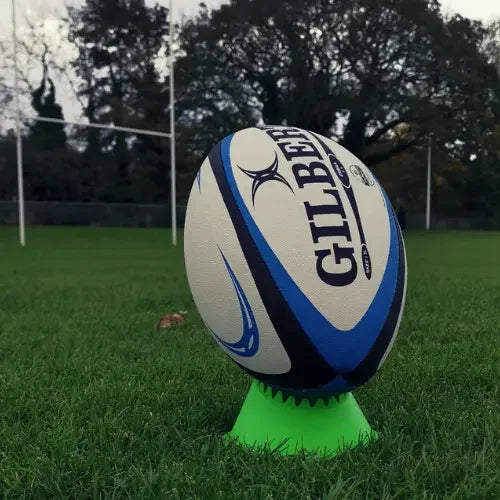Diet for rugby players; the basics - by Ben Coomber
We are absolutely delighted to announce a huge guest blogger - Ben Coomber.
For those that don't know Ben then you are about to meet a guy who cuts through a lot of the noise made by the Health & Fitness industry - this guy just talks sense. Ben also happens to ply his trade at scrum-half.
Young players take note, over to Ben....

There are two things in life that I am truly passionate about. One of those is using my knowledge and experience as a performance nutritionist to help change people’s lives. The other is rugby.
I play scrum half for my local team and apart from my silky skills on the pitch I also offer a good line in trash talk.
One thing that I have noticed over the years is that most recreational rugby players take their training seriously, most clubs have a gym and many of the players follow their own strength and conditioning program outside of the training offered by the club.
But, many rugby players don’t have their diet dialled in and this is what this blog is all about.
Real food first

The basics of a sports performance based diet is not vastly different to that of anyone else’s basic needs.
Ensure that the majority of the food you eat is of a good quality.
Placing an emphasis on natural whole foods will ensure that you are getting plenty of essential nutrients to help you train, compete and recover.
I always say a minimum of 80% single ingredient foods with about 10% from minimally processed foods and then a final 10% from less healthy option.
I know players love a beer after pulling off their rugby boots so this is your 10%.
Of course, you can be more relaxed than that on the odd occasion but a little discipline for the most part will go a long way to making you a better player, or simply getting more enjoyment from your performances.
Eating plenty of veg, natural protein sources and fibre will all help to keep you strong and healthy.
Performance specifics
So, expanding on that previous point an athlete has a greater need for protein and the ISSN recommend a ratio of 1.5-2g per kg of body weight for highly active people.
I actually eat more than that myself and if you are a well-muscled person it may indeed be necessary to push that up to around 2.5g per kg in order to maintain your lean mass.
You can of course use protein shakes (I recommend Awesome Whey) to help with this but the main focus should be on just eating quality meats, fish and eggs and some plant based proteins like nuts and pulses.

The next most important macronutrient is carbohydrates and these provide the simple energy stored in your muscles (glycogen).
The more intense your activity the more glycogen you burn.
For this reason the ISSN recommend a ratio of 3-5g per kg of body weight for moderately active people and as much as 5-8g per kg for highly active people, like you.
I would always listen to your own body here.
So personally I get quite a lot of my energy from fats, so eat closer to the lower end of those scales but with extra carbs in and around training and matches.
Carbohydrates also help with muscle recovery and so it’s important to get some carbs in post-match, usually in a ratio of 3:1 carbs:protein (side note, if you want a few beers after the game as I always do, I save a lot of my carbs for beer, so have protein and a little carbs after the game, but then save room for a few pints).
For the most part your carbs will come from the more ‘complex’ sources like potatoes, sweet potatoes, rice and quinoa with the faster releasing carbs like sugary drinks and snacks being consumed during and after a match for fast absorption.
I’ve already mentioned vegetables but this is important because they provide us with vitamins, minerals and fibre which are essential for recovery, for immune function and energy partitioning.
However, I would exercise caution on match day where fibre is concerned.
So, whereas you need plenty of it through the week you might want to cut back the day before and on the day of the match to avoid accidents.
Your teammates probably have enough on you already without you handing them the opportunity to nickname you brown pants.
Now I want to get a little more specific about an often overlooked aspect of health and fitness and that’s recovery.
If you are well recovered after a match or training session it stands to reason that you will perform well the next time you strap on your boots.
The basics
The basics are so important, this is the base of the pyramid and if you get this part wrong then everything else will be a waste of time.
What are the basics?
Eat a predominantly whole food diet with plenty of vegetables and I do mean PLENTY! Aim for around 5-7 portions of different veggies a day.
Different coloured veg contain different micronutrients and fibres which will help to keep your immune system strong and your digestion effective.
Be well rested between periods of heavy activity.
I know what it’s like as a keen sportsman and you don’t necessarily like sitting around and feel either guilty or just sluggish when you don’t train, but it’s important for your body to get some rest in order for specific adaptations to take place.
Sleep is a big part of this so do your best to create a routine that optimizes your chances of getting a good night’s sleep.
Aim to go to bed at the same time each night, give yourself enough time to get 7-9 hours of sleep every night.
It may help you to do some relaxation exercises before bed, to write a journal entry or job list to help relax your mind and to avoid caffeine after 5pm (or earlier if you are sensitive to it).
Don’t confuse high energy levels with pent up nervous energy this might indicate that you are actually running on adrenaline most of the time and will put your body under a significant amount of physiological stress so find ways to calm your mind and relax your body.
Make sure you’re well hydrated. As a highly active sports person your need for fluid is greater than the average person.
The following equation will help you to determine how much water you should be drinking. 28 x weight in kg.
Example:
An 80kg rugby player needs (28 x 80) = 2,240ml a-day (add extra for exercise)
Of course, this is a guide and your needs will vary depending on levels of activity, food consumed and air temperature.
So, I usually say aim for 2-3 litres a day with an additional 500ml-1L on training/match days.
It’s useful to have some electrolytes in your bottle during training or matches to help replace some of the lost minerals and improve absorption.
Awesome Supplements do electrolyte powders that you can add to your water and they come with or without carbs, you can find them HERE.
Other considerations
If your diet isn’t great you may consider taking a multi-vitamin like Awesome Supplements Daily Dose but I would always encourage you to get your diet on point as best you can.
Magnesium is a common mineral deficiency in athletic populations and is responsible for over 300 physiological processes in the body.
Magnesium also acts as a muscle relaxant, can reduce the risk of cramps and post exercise soreness.
I am a big fan of transdermal magnesium because it by passes the digestive tract where a lot of the minerals are lost.
Awesome Recovery Spray contains magnesium and zinc for this very reason and limits how much you are sore the day after training, or more importantly, the day after a game.
Trust me, I promise it will help, never had a rugby player not say it helps, grab a bottle HERE and see how much better you feel after game day now.
Make time for some active recovery activities such as light stretching or yoga. Going for walks or some other form of light cardio on recovery days.
Foam rolling can help to increase blood flow to your tired muscles or just taking time to sit and appreciate little quiet time.
Lastly, and I wouldn’t be a rugby player if I didn’t mention this, but try not to get too pissed too much.
Yeah, I know we love a beer or 6 after a match but if you really want to recover well and perform at your best I strongly advise you to exercise a little restraint.
You may black out and sleep for 10 hours after a bender but it’s not restful sleep and the dehydration caused by excessive alcohol consumption can be pretty brutal.
Have a couple of pints with your mates and then go home for a roast dinner with the family, combine that with my previous advice, some recovery spray, and I promise you will be recovering better in no time.
Diet for rugby players
Earlier, I wrote about the importance of recovery and gave some good tips for the practical implementation of good recovery techniques.
If your recovery is inhibited in any way your performance will suffer.
Therefore, go back and check the previous articles to ensure that you have all the basics dialled in.
Eat for performance
Aim for around 2g of protein per kg of body weight. 2g should be enough for most people but if you like protein foods or are heavily muscled, you can go higher.
This way your muscles will repair themselves and prevent muscle wastage if you are in a deficit, like when you are getting lean pre-season.

You don’t have to chug gallons of whey protein to achieve this, so try to get the majority of your protein from whole food sources like meat, eggs and pulses.
However, a protein shake can be convenient on training days. Just make sure that wherever you set your protein target that this remains constant each day, regardless of training stimulus.
Carbs become really important for rugby players.
Your muscles store carbohydrates as glycogen and when you deplete glycogen performance becomes almost impossible.
The ISSN recommend 3-5 g of carbohydrates per kg of bodyweight for moderately active individuals but as much as 5-8 g/kg for highly active individuals like you.
My advice would be to get complex carbs in before a match, simple sugary carbs during and then a nice helping of starchy carbs with your post-match meal. Aim for potatoes, brown rice, quinoa, pulses, etc.
Unlike with protein, you can ‘cycle’ your carbs so that you consume higher carbs on heavier training and match days and fewer carbs on less active days and if done correctly this can, in fact, help to improve glycogen utilisation on those highly active days.
If you train twice in a day, then drinking a solution of 3:1 carbs to protein immediately after training to rapidly replenish your intra muscular glycogen reserves is advised.
But, if you have time you could consume a meal at that ratio.
For example; 40g of protein from grilled chicken with 120g of carbs from rice, potatoes or quinoa. Of course, some of those carbs could come from a drink like, say fruit juice or Awesome electrolytes + carbs, just don’t forget your veggies.

Are you bored yet?
At this point I feel it’s important to point out that whereas the official guidelines are all good and definitely worth paying attention to these are based on research that is performed on elite rugby players and athletes.
Now, I’m not saying that you aren’t good and it’s quite possible that in your own head you are elite. I think I’m pretty frickin’ elite!
But, the fact of the matter is that we are recreational sportsmen with normal lives.
We have work and family commitments and a social life which may mean that some of these recommendations are inconvenient, or hard to stick to.
It’s absolutely fine to be just 70% perfect and, in fact, being 70% perfect 100% of the time is far better than being 100% perfect 30% of the time.
This is where a little flexibility comes in to play. So long as you get the basics right and strive to do some of the above when it matters this will reap more rewards than fading in and out of it intermittently.
I will just say this though. The best time to get anal about your approach to nutrition is on match day because that’s when the world (well, your girlfriend) will be watching.
Anything else?
Lastly, there are a few extra things that you can include that provide certain ergogenic assistance but keep in mind these provide a marginal edge and only, really, work if you have the basics set-up.
For instance, no amount of creatine will make you stronger or faster if you are eating junk foods, not training sensibly and not getting a good night’s rest.

Let me just clarify that when I say ergogenic aids, I’m talking about evidence based sports supplements, not illegal and potentially dangerous substances, you know what I’m talking about.
 Bio:
Bio:
Ben Coomber is a performance nutritionist (BSc, ISSN), educator, speaker and writer. Ben also run’s Body Type Nutrition, an online nutrition coaching company that also runs a multi-level, online nutrition course, the BTN Academy. Ben also owns Awesome Supplements, a brand offering clarity in the confusing world of supplements.











